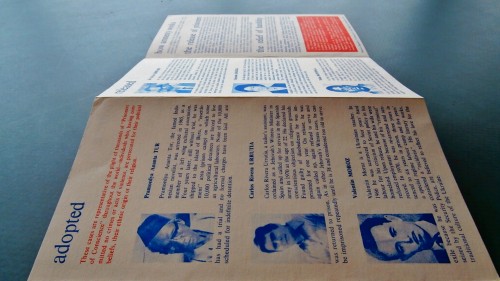Adopting a prisoner
The most intensive way of writing for the release of a prisoner is the adoption group. These groups were very active in the 1960s and 1970, but they still exist. Members of local Amnesty teams are committed to one or a few prisoners for a longer period. By monthly writing to local authorities, embassies, the prisoner’s families and the prisoners themselves, they gather as much information as possible. This information is vital to create good arguments for the release of the prisoners.
To me Amnesty was an organization that dealt with bad conditions in a useful way. In those times the goal was mostly freeing prisoners and improving conditions in prisons. By writing letters, I supported this. –  Mea, writing since the 1970s for Amnesty in Amstelveen, 2013

Three adopted prisoners of Amnesty International, 1980s
Courtesy of Amnesty International. Archive Amnesty International Netherlands, IISH, Amsterdam
From 1961 to 1971, 2500 of the 6000 prisoners adopted by Amnesty International were released. In the 1960s, 900 adoption groups were active in the Netherlands. Since the 1980’s, Amnesty International evolved a broader scope than the intensive adoption method and the number of adoption groups decreased. Fundraising, education and special country actions became more important for local Amnesty teams. Adoption groups still exist, but they now organize a wider range of activities instead of writing for one prisoner.

Johan Teterissa was sentenced for lifelong imprisonment
Courtesy of Amnesty International Netherlands, headquarters Amsterdam
In 2013 examples of adoption could still be found. The Indonesian teacher Johan Teterissa was sentenced for lifelong imprisonment in 2007. He had waved an ‘illegal’ Moluccan flag during a protest against the Indonesian president. His living conditions were very poor but his imprisonment was shortened to 15 years in 2008, thanks to the efforts of Amnesty actions all over the world. The adoption group of Amnesty Gouda is actively involved in the case of Johan Teterissa.
 Follow
Follow